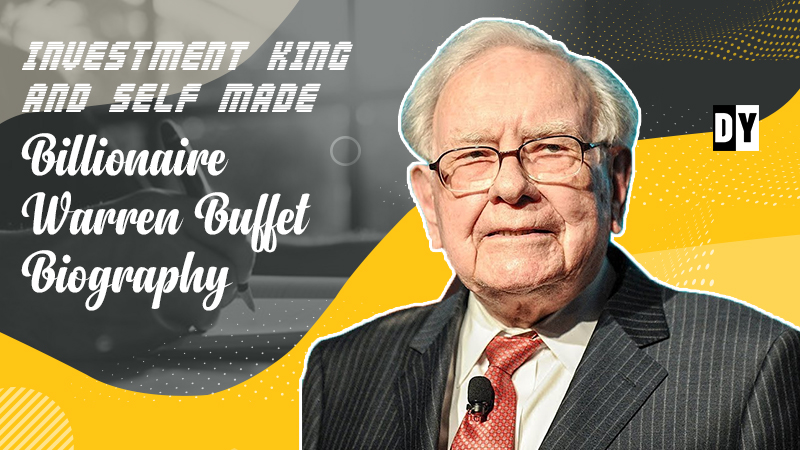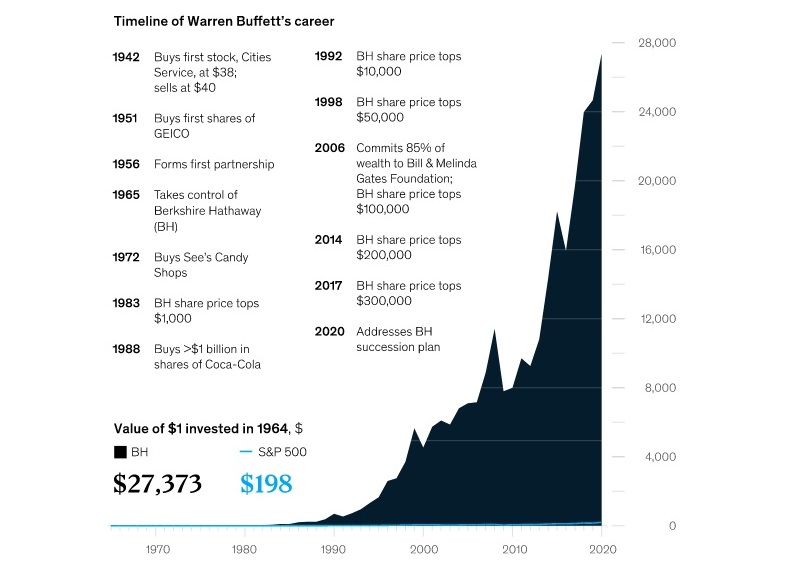
Warren Edward Buffet is the chairman and CEO of Berkshire Hathaway and an American investor, corporate magnate, and philanthropist. He is regarded as one of the world’s most wealthy businessmen, with a net worth of more than $100.6 billion as of April 2021, making him the world’s seventh-richest individual.
Warren Buffett was born in Omaha, Nebraska, on 30 August 1930. His father, Howard, was a stockbroker with his own business, and his mother, Leila, was a stay-at-home mother. Buffett had two wives, one older and the other younger than him. Warren spent time at his father’s brokerage firm as a child, writing numbers on the chalkboard and reading the books. He had a close relationship with his father, whom he describes as affectionate and inspiring. He attributes much of his success to him, claiming that he was the one who first exposed him to investing and his passion for reading.
Buffett attended Omaha’s Rose Hill Elementary School. He was always fascinated by numbers as a child, and he also had a keen interest in collecting stamps and bottle caps.
At the age of 16, he enrolled in the Wharton School of the University of Pennsylvania to study “Business.” He soon realized, however, that he understood more than his professors after “two years of trying.” He moved ahead to the University of Nebraska in Lincoln, where he graduated with a bachelor’s degree in business administration. Mr Buffett also received a Master of Science in economics. Later on, in 1951, Mr Buffett graduated from Columbia University with a master of science in economics.
From 1951 to 1954, Buffett worked as an investment salesman at Buffett-Falk & Co., then as a stock analyst at Graham-Newman Corp., then as a general partner at Buffett Partnership, Ltd. from 1956 to 1969, and finally as Chairman and CEO of Berkshire Hathaway Inc. from 1970. Buffett found Graham on the board of GEICO insurance in 1951.

Travelling to Washington, D.C. by train, He pounded on the door of GEICO’s headquarters on a Saturday before a janitor let him in. He met Lorimer Davidson, Vice President of GEICO, and the two spoke about insurance for hours. Davidson would go on to become a lifelong friend and a significant influence on Buffett. After just fifteen minutes, he considered Buffett to be an “extraordinary individual,” he would later remember. Buffett wanted to work on Wall Street but was discouraged by his father and Ben Graham. Graham declined his offer to work for him for free.
Buffett invests in the Benjamin Graham value investing academy. Value investors seek securities with unjustifiably low prices compared to their intrinsic value. Although there is no widely accepted method for calculating intrinsic value, it is often calculated by examining its fundamentals. The value investor, like bargain hunters, looks for stocks that are undervalued by the market or stocks that are expensive but aren’t recognized by the majority of buyers.
Buffett brings the concept of value investing to a new stage. The efficient market hypothesis is contested by many value investors (EMH). According to this theory, stocks often trade at their fair value, making it more difficult for investors to purchase undervalued stocks or sell them at inflated rates. They believe that the market will finally begin to favour certain high-quality stocks that have been undervalued for some time.
He considers each company as a whole, so he selects stocks solely based on their overall potential. Buffett doesn’t expect capital gain when he buys these stocks as a long-term investment, but rather an equity of high-quality businesses that can generate earnings. Buffett isn’t concerned with whether the market will ultimately accept a company’s value when he invests in it. He is worried about the company’s ability to generate profits.
Summing UpWarren Buffett is a quirky, down-to-earth businessman who has achieved success in ways that most people can only dream of. Ironically, the guy has a humble disposition and explains investing in a grandfatherly manner. Here are ten lessons learned from the Oracle of Omaha, based on quotes, business decisions, and a general value strategy that has outperformed almost all.
Latest Updates from around the world
Most read stories, topics, and videos
Latest Updates from around the world